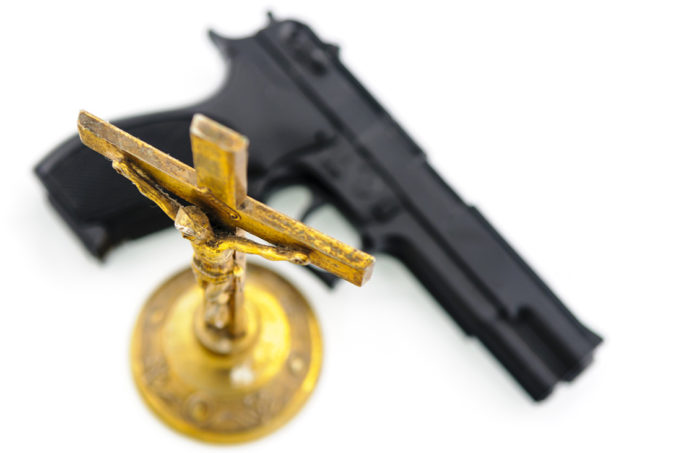For 40 years, Bill Sillers volunteered as an usher and for the eucharistic ministry during the 8 a.m. mass at St. Patrick Cathedral in downtown Fort Worth. He served as a lead usher and wrote a detailed 14-page handbook to help things run smoothly and efficiently. Sillers, 77, told me he was proud to serve with the other men who quietly walk the aisles in their red jackets, the most distinctive part of the uniform worn by the 8 a.m. ushers.
A retired Fort Worth police officer, Sillers is a 27-year veteran of the force and brought a concealed firearm to church every week to protect himself, wife Mary Sillers, and other parishioners. Fortunately, he he said, never had to use his weapon.
His many years of service abruptly ended earlier this month, shortly after he objected to the church’s new and beefed-up security program. Sillers said he was being recruited for the new “armed guardians” program but wanted no part of it. In his opinion, the program has a militaristic tone and could lead to lawsuits against participants and the church.
The program integrates the “duties and actions” of ushers, greeters, trained medical personnel, and armed guardians –– contracted law enforcement officers and parishioners who are licensed to carry a gun. A protection ministry team (PMT) leader will oversee the group, according to a document we obtained.
About 15 minutes before mass began on Feb. 9, Sillers was directed into the sacristy, a room where the priest makes his final preparations for mass. There he was handed a letter signed by the Rev. John Robert Skeldon and Deacon James M. Crites, the parish liaison for the protection team ministry.
The letter begins by thanking Sillers for his many years of service. “Your efforts have directly resulted in the most comprehensive and effective usher program in St. Patrick’s Parish,” the letter reads. It goes on to inform Sillers that his services as lead usher are no longer needed. He was also forbidden to bring his firearm on church grounds.
“Since you have declined to apply for or participate in the training and activities of the PMT, it will be necessary for you to vacate your position as the lead usher for the 8 a.m.,” the letter reads. The same thing happened to two other men who served with him in the usher ministry, Sillers said.
Some of the ushers held mini-protests during the Feb. 16 service over what happened to the ushers who were ousted, said Brian Lynch, who recently joined the usher ministry at Sillers’ request. Lynch said he decided to not collect donations on that day, and others refused to wear their red jackets.
Lynch said his ushering days could also be numbered because his wife confronted a church deacon over what happened to Sillers. He said he understands the need for security, but he doesn’t want to see the church turn into the “O.K. Corral.”
Sillers, meanwhile, hasn’t returned to the church since his last day of ushering on Feb. 9. He finished his duties that day “out of respect to the ushers who were there.” After that, he told his peers that he would not be returning. Sillers was not kicked out of the church, but he said he thought it was best to stay away, at least for a little while.
Shortly after Sillers left, the diocese announced on Feb. 17 that it hired a new security director and is implementing a new program to “select, train, and deploy parishioners to respond in an armed capacity during emergencies,” according to a news release. In part, the program is an answer to a 2018 directive by Bishop Michael Olson to strengthen security and safety. The diocese also announced that Michael Short, a former Lewisville police detective, will serve as the diocese’s new director of security. Short previously worked for the diocese as a consultant through his company, Guardian Response.
In the news release, Stephen Becht, diocesan director of real estate and construction, said Short is working to establish a “discreet security program” at the diocese’s 91 parishes and 19 schools. Short’s 15-year career with the Lewisville police included serving as a member and leader of the SWAT team and as a detective in both the burglary and property crimes units and the crimes against children unit.
Chief of Staff Deacon Walter John Stone said during a phone interview that there are some misconceptions about the new program.
“We are not arming all of the ushers,” Stone told me.
Pat Svacina, the diocese’s communications director, said the guardian ministry is separate from the ushers, who are also called hospitality ministers.
“In compliance with diocesan policy and state law, no one is allowed to carry weapons in the churches of the diocese except peace officers and, now, properly trained guardian ministers,” Svacina wrote in an email.
Members of the guardian ministry must have a concealed weapons license. They also must undergo an extensive background check, psychological screening, and training, Svacina wrote. Some parishes are holding a training session so that ushers understand how the guardian ministry works.
“The idea of the guardian ministry is that no one in the parish knows who members of the ministry are, much like the federal sky marshal program,” Svacina said.
Sillers was reluctant to talk about what happened and made it clear that in no way did he want to “bash the church” and its leadership members.
“I don’t like it, but there’s nothing I can do about it,” Sillers said about his departure as lead usher. “They can do whatever they want.”
Sillers said he loves St. Patrick Church and vividly remembers the day he spoke with a priest about joining in 1976.
“He wanted to send me to another church that was closer,” said Sillers, who insisted on joining St. Patrick. The priest, who smoked a pipe, extinguished his match in the sign of the cross and said he would sign Sillers up.
In a Feb. 10 letter to his fellow ushers, Sillers wrote that he stands “in the shadow of giants. One person cannot make this work. It takes an unselfish team. … I truly believe that God has blessed this ministry beyond my expectation. I’m saddened to see it slowly dismantled. If it has served His will, then we are all truly blessed to have been a small part of it.”
He signed his letter, “May God continue to bless this ministry, Bill.”












